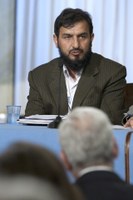 This was the recommendation made by Mohamed H.A. Hassan, executive director of TWAS, at the 'Conference on Afghanistan and its geographical context: Development of a regional network of cultural and scientific cooperation, held on 26 June 2009 in Trieste, Italy, within the framework of the G8 Ministerial Meeting.' The conference was co-organized by the Italian Ministry of Foreign Affairs and TWAS.
This was the recommendation made by Mohamed H.A. Hassan, executive director of TWAS, at the 'Conference on Afghanistan and its geographical context: Development of a regional network of cultural and scientific cooperation, held on 26 June 2009 in Trieste, Italy, within the framework of the G8 Ministerial Meeting.' The conference was co-organized by the Italian Ministry of Foreign Affairs and TWAS.
"If successful, this high-level mission", Hassan says, "could result in a blueprint that helps Afghanistan take the first steps towards sustainable economic growth."
Abdul Bari Rashed, president of the Afghanistan Academy of Sciences, noted at the conference that his academy is in a much better shape than it was just three or four years ago, "when the institution's future existence remained very much in question." Several months ago, Rashed noted, "the Afghan government signed an official decree recognizing the academy, and a new building is now nearing completion that will provide the academy with secure and ample space to conduct its activities."
Rashed acknowledged that enormous problems continue to exist – in guaranteeing security, providing adequate funding and having a sufficient number of well-trained researchers on hand who are capable of doing research. Yet, the situation is markedly improved from just a few years ago. As a result, he said that "now may now be an appropriate time to develop a comprehensive plan of action based on the current situation and with the help of such organizations as TWAS and IAP.
S.K. Sahni, executive secretary of the Indian National Science Academy, and Atta-ur-Rahman, president of the Network of Academies of Sciences in Countries of the Organization of Islamic Conference in Pakistan (NASIC), also noted that scientists and scientific communities in their countries were ready to expand regional cooperative initiatives with Afghanistan.
"The key to moving this effort forward," noted Hassan, "lies in developing a credible plan of action, with input from the Afghan scientific community, and securing adequate funding from donors to ensure that we execute the plan in a timely and effective fashion."
The 'Conference on Afghanistan and its geographic context: Development of a Regional Network of Cultural and Scientific Cooperation' was attended by more than 100 members. It included presidents and representatives of the Afghan, Chinese, Egyptian, Indian, Iranian, Italian, Pakistani, Russian and Turkish academies of sciences and heads of scientific centres. The directors of Trieste's scientific centres also made presentations.
The opening session of the conference, which was moderated by Hassan, featured speeches by Franco Frattini, Minister of Foreign Affairs, Italy; Rangin Dadfar Spanta, Minister of Foreign Affairs, Afghanistan; and Hon. Makhdoom Shah Mahmood Qureshi, Minister of Foreign Affairs, Pakistan.

